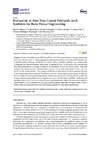Identificador persistente para citar o vincular este elemento:
https://accedacris.ulpgc.es/jspui/handle/10553/71483
| Título: | Evaluation of Aloe Vera Coated Polylactic Acid Scaffolds for Bone Tissue Engineering | Autores/as: | Donate González, Ricardo Alemán Domínguez, María Elena Monzón Verona, Mario Domingo Yu, Jianshu Rodríguez Esparragón, Francisco Javier Liu, Chaozong |
Clasificación UNESCO: | 3313 Tecnología e ingeniería mecánicas 3314 Tecnología médica |
Palabras clave: | Regenerative medicine Additive manufacturing Plasma treatment Coating method Aloe vera extracts, et al. |
Fecha de publicación: | 2020 | Proyectos: | Mejora de la Biofuncionalidad de Scaffolds Polimericos Obtenidos Por Fabricacion Aditiva Biomaterials And Additive Manufacturing: Osteochondral Scaffold Innovation Applied To Osteoarthritis |
Publicación seriada: | Applied Sciences (Basel) | Resumen: | 3D-printed polylactic acid (PLA) scaffolds have been demonstrated as being a promising tool for the development of tissue-engineered replacements of bone. However, this material lacks a suitable surface chemistry to efficiently interact with extracellular proteins and, consequently, to integrate into the surrounding tissue when implanted in vivo. In this study, aloe vera coatings have been proposed as a strategy to improve the bioaffinity of this type of structures. Aloe vera coatings were applied at three different values of pH (3, 4 and 5), after treating the surface of the PLA scaffolds with oxygen plasma. The surface modification of the material has been assessed through X-ray photoelectron spectroscopy (XPS) analysis and water contact angle measurements. In addition, the evaluation of the enzymatic degradation of the structures showed that the pH of the aloe vera extracts used as coating influences the degradation rate of the PLA-based scaffolds. Finally, the cell metabolic activity of an in vitro culture of human fetal osteoblastic cells on the samples revealed an improvement of this parameter on aloe vera coated samples, especially for those treated at pH 3. Hence, these structures showed potential for being applied for bone tissue regeneration. | URI: | https://accedacris.ulpgc.es/handle/10553/71483 | ISSN: | 2076-3417 | DOI: | 10.3390/app10072576 | Fuente: | Applied Sciences (Basel) [ISSN 2076-3417], v. 10 (7), 2576 |
| Colección: | Artículos |
Vista completa
Citas de WEB OF SCIENCETM
Citations
15
actualizado el 22-feb-2026
Visitas 10
339
actualizado el 15-ene-2026
Descargas
139
actualizado el 15-ene-2026
Google ScholarTM
Verifica
Altmetric
Comparte
Exporta metadatos
Los elementos en ULPGC accedaCRIS están protegidos por derechos de autor con todos los derechos reservados, a menos que se indique lo contrario.
